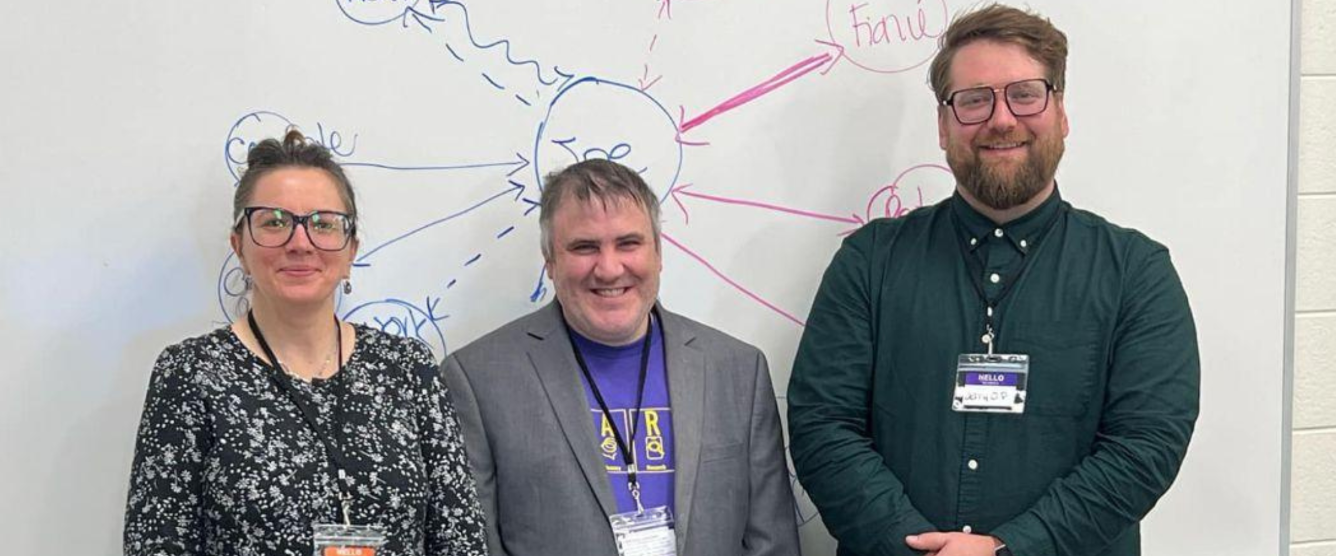Nipissing University Students and Faculty Collaborate

Nipissing researchers are helping to shine a light on the importance of inclusivity in research. This commitment was on display at the PARN Research Camp, held this past October at Brock University’s St. Catharines campus, where students, researchers, and allies gathered to explore inclusive and participatory research methods. This immersive, three-day event was co-developed and delivered by over 30 individuals with lived experiences, researchers, and community allies who shared insights and skills to improve research practices focused on enhancing the quality of life for adults with intellectual and developmental disabilities (IDD) and their families.
Among the group of presenters were Nipissing University social work professor Anna Przednowek and student researcher Jerry Poliszczuk. Together with their colleague David Hill, they led a workshop on ecomaps as accessible and inclusive research methods, a topic that sparked enthusiastic engagement.
PARN (Participatory Advocacy Research Network) is a group of individuals living with intellectual and developmental disabilities, along with allies and researchers. Together, they work on research aimed at understanding and addressing issues that affect the lives of individuals with IDD. The PARN Research Camp is designed to foster collaborative learning and encourage participants to engage in accessible research methods that honour the lived experiences of those directly impacted.
“Being a social work student, it was interesting seeing how eco-maps, a social work tool, could contribute towards inclusive and accessible research,” said Poliszczuk. He also reflected on the sense of community at the Research Camp. “There was such a strong sense of community,” he said. “Everyone, whether they were workshop facilitators, students, or lived-experience experts, was invested in ensuring the success of the camp.”
Professor Przednowek emphasized the significance of the event in allowing students to connect theoretical knowledge with practical experience. “It’s incredibly enriching to see theory come to life and, as educators, to witness our students growing into allies and leaders in their own right,” she said. “The camp reinforced the importance of inclusivity in research and the role that lived experience can play in making research methods truly accessible.”
Ashlee Dagenais, a researcher and advocate with cerebral palsy, co-presented ‘Voices Lost in Crisis’ alongside Dr. Laura Mullins of Brock University. The presentation highlighted how IDD individuals were often overlooked during the COVID-19 pandemic. Dagenais reflected on the emotional responses from the audience as she discussed the challenges faced by the IDD community.
Dagenais reflected on the success of the presentation, describing it as deeply moving to witness the audience's emotional reactions, particularly when discussing how individuals with IDD were overlooked during the crisis. She highlighted the crucial role of support in her work and expressed gratitude for the welcoming and accommodating environment at PARN, noting how valued and cared for she feels at these events.
Elizabeth McDonough, another presenter with lived experience, led an arts-based research workshop where participants expressed their thoughts through drawing and responding to prompts, ultimately fostering a sense of community and belonging with other participants who had similar answers. Reflecting on the camp, McDonough emphasized the sense of community and care, noting how impactful the leadership workshop and the overall atmosphere of friendship were for her.
Following the success of the Research Camp, PARN is taking steps to further enhance support for individuals in the intellectual and developmental disability community. A new website will be launched to share resources and research aimed at improving lives. The website will feature blogs and forums where everyone can connect, share experiences, and collaborate on projects.
For those considering attending future PARN Research Camps, Poliszczuk offered advice: “Take the next step and attend, you won’t regret it. You’ll not only gain new knowledge about research methods, but also experience the power of inclusive and collaborative participatory research.”
In addition to the website, PARN is developing a Community of Practice, which will allow self-advocates, allies, and researchers to meet online regularly to discuss issues related to research. Topics will include problem-solving barriers to inclusive research, sharing feedback and ideas on initiatives, discussing how to make research more accessible, as well as how to use research findings to inform advocacy efforts and social change
The PARN Research Camp not only provided a platform for exploring accessible research methods and sharing lived experiences but also fostered an environment of inclusivity and collective care. Participants left the camp with new knowledge, skills, and a renewed sense of community and connection.
